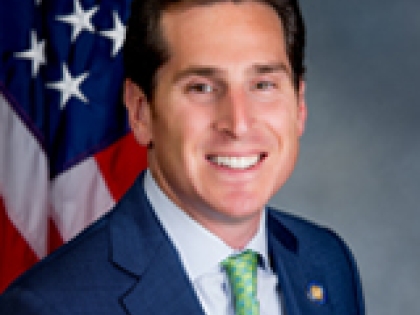
State wants schools to conduct inventory of flooring, test for mercury vapor
The state Education Department on Wednesday requested all New York schools conduct an inventory of rubberlike floors and recommended testing them for mercury, after three Long Island schools shut down facilities this spring upon detecting mercury vapors.
In a letter sent to superintendents, nonpublic school leaders and charter school leaders, the state also recommends that schools that have this type of polyurethane flooring follow Minnesota guidance to test the flooring for mercury. New York has no standards.
“We have learned that rubberlike polyurethane floors using phenyl mercuric acetate (PMA) catalyst were installed in school multipurpose rooms, gyms, cafeterias, auditoriums, stages, and indoor tracks between the 1960s and the 1990s,” according to the notice signed by state Education Commissioner MaryEllen Elia. “PMA can break down and release odorless, colorless mercury vapor at room temperatures. The floors and items that have been in contact with them emit mercury vapor indefinitely."
The Minnesota rules state this type of flooring should be tested by a laboratory for total mercury content. If it is above the target level, 20 parts per million, the school should perform an indoor air screening that evaluates both the mercury release by the flooring as well as the room ventilation. If necessary, more in-depth air testing could be carried out.
Department officials said while the survey is not mandatory, it recommends that schools believed to have this type of flooring participate. According to state data, there are 4,435 public schools and 349 charter schools across the state's 733 districts. Additionally, there are 37 regional BOCES districts in New York State and about 1,800 nonpublic schools.
The state has created links for districts, charter and nonpublic schools to report their inventory. Once data are collected, the Education Department, with the Department of Health, anticipates providing further guidance based on the results of the inventory effort.
“While the existence of this type of flooring has been known for many years, the department would like current information to better assess the scope of the issue,” the commissioner's letter read.
Newsday reported last month that mercury vapor had been found in three schools — one each in the Amityville, Merrick and Miller Place districts — in areas with this type of flooring. That prompted state legislators to introduce a bill to set mercury vapor standards in schools.
No additional districts beyond those three have contacted the Education Department, according to an official.
The State Senate unanimously passed a bill Wednesday that would set a standard for mercury vapor and ban future installation of mercury-containing flooring. The legislation must pass the Assembly and be signed by Gov. Andrew M. Cuomo before becoming law.
Bill sponsor Sen. Todd Kaminsky (D-Long Beach) said the statewide survey will be helpful, but the Education Department needs to figure out a plan to deal with mercury-emitting flooring.
“Having an inventory of which schools contain this flooring and how extensive the problem is is an important first step. But I’d urge [the Education Department] to work with real dispatch here, because soon kids will be coming back from summer break and using these gymnasiums, especially in cold weather, and there needs to be a plan to deal with those gymnasiums emitting toxic mercury vapor,” he said.
Kaminsky said he hasn’t heard of any additional schools that have found mercury vapor, but added, “I think schools were waiting to get guidance from [the] state. The result will almost certainly be other schools with problems.”
The Education Department's letter noted that the floors installed from the 1960s to 1990s are rubberlike and water-resistant, usually one piece and poured in place. They can be smooth, stippled or mesh-line and may have been covered by another floor.
“Exposure to mercury vapor may be worse if floors are damaged or deteriorated or located in hot rooms with poor ventilation or a lack of air-conditioning,” read the guidance.
It also noted that not every polyurethane floor used mercury as a catalyst, and the mercury content varied in flooring that used it.
Tests found low levels of mercury vapor at Park Avenue Memorial Elementary in Amityville and Norman J. Levy Lakeside Elementary in Merrick, as well as the Miller Place High School gymnasium, according to notices sent to parents in April and May.
Schools told parents there was no threat to children and that the facilities were closed as a precaution.
Health experts have said that mercury vapors even at low levels can accumulate in the body and eventually affect brain function, particularly in children.
Merrick and Amityville tests show concentration levels there mostly below standards set by other states for short- and long-term exposures. The levels, however, were above a U.S. Environmental Protection Agency standard for a lifetime of continuous exposure.
Miller Place has not yet released its testing reports in response to a May 7 Freedom of Information Law request.
In Merrick, the school board on Tuesday night passed an emergency resolution to remove and replace flooring at the "Cubs Cave" at Levy Lakeside Elementary, according to a letter sent to parents Wednesday by Merrick Superintendent Dominick Palma and a notice posted on the district's website.
"While the levels detected are very low and are not at the level defined as 'hazardous' for purposes of removal, the board and administration would like to eliminate the mercury containing material within Cubs Cave," according to the letter. The area, which had been a multipurpose room used for physical education, lunch and other activities, will remain closed to students and staff. The district plans to replace the flooring and concrete underneath this summer.
Miller Place High's gymnasium "remains closed, sealed, under negative air pressure with no access to students and staff," according to a May 22 letter to parents from Superintendent Marianne F. Cartisano.
She wrote that the synthetic flooring, as well as wood flooring that had covered it, was removed when students weren't in class — from 9 p.m. to 5:30 a.m. on weekdays and "around the clock on most weekends." Further testing will be done to determine whether new wood flooring can be installed or the "slab" underneath will have to be removed.
With the gymnasium closed, the school district's high school graduation June 26 will be held at Stony Brook University Island Federal Arena because of uncertainty about where the ceremony would be held in the case of rain.
Park Avenue Memorial Elementary in Amityville had removed the flooring at its gymnasium and sealed off the area, but still was detecting mercury. The district's spokesperson did not respond to a request for an update Wednesday.
